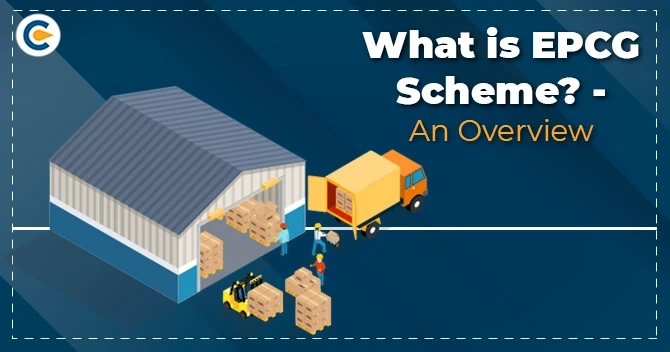Export Promotion Capital Goods Scheme (EPCG Scheme), can be summarized as "Duty-Free (Zero Customs Duty) Importation of Capital Goods/Machinery in order to produce products intended for export." Capital Goods can be used to produce, pre-production, and post-production of goods. This scheme is also known as the zero-duty EPCG Scheme.
We all are well aware of the large custom duties that Capital machinery imports must be subject to. Because of this, businessmen tend not to import them or compromise the quality of the products. The customs duties were higher when the Machinery was more expensive. This functionality began to impact the quality and competitiveness of manufacturing industries.
To remedy this, the Government of India introduced a scheme that allowed capital goods imports to be made at zero customs duty. To facilitate the Import of Capital Goods/Machinery to produce high-quality products and services, the Government of India created the EPCG Scheme. The EPCG Scheme's main objective is to make India more competitive in the manufacturing sector.
Objectives of the EPCG Scheme
The EPCG (Export Promotion Capital Goods) Scheme aims to promote capital goods imports in order to produce high-quality goods and services and increase manufacturing competitiveness.
EPCG Scheme: Features
Merchant Exporters or manufacturers with supporting manufacturers can import capital goods at 0% duty. The authorization holders who are allowed to import capital goods at 0% duty must agree to an export obligation equivalent to six times the amount that was saved in taxes and duties.The export obligation must be fulfilled before the imported capital goods can be sold or transferred.You should have capital goods installed within six months after imports.The authorization holders will need to file a bond at the customs prior to the import of capital goods.The EPCG scheme doesn’t cover secondhand goods.The EPCG Scheme allows you to import certain types of capital goods/machinery
All capital goods, complete and semi-knocked down, as well as conditioned goods.All software and computer system are included in the capital goods.Molds, spares. Jigs. Dies. Tools. Fixtures.Catalysts will be charged for the initial charge, and then one more charge.According to FTP 2015-20 para 9.08, capital goods are "any plant, machinery or equipment that is required for the manufacture or production of goods or rendering services. This includes those needed for replacement, modernization, and technological up-gradation. Packaging Machinery and equipment includes power generating equipment, power generating machines, machine tools, equipment and instruments for testing and research and development, quality, and pollution control. Capital goods can be used for manufacturing, mining, aquaculture, or animal husbandry.
What is the EPCG License and who can apply?
The EPCG Scheme's main benefit is the ability to import capital goods at zero duty.
Eligibility Criteria in order to apply under the EPCG scheme-All Exporters can benefit from the EPCG Scheme regardless of their turnover. These Exporters are eligible for an EPCG License:Manufacturer Exporter.Merchant Exporter with a supporting producerFor example, Service Provider is someone who exports services. Hotel Industry.Duties Exempted under EPCG Scheme-
Capital goods that are subject to the EPCG Scheme can be imported with zero duty. However, IGST/Compensation Cess are only exempted. A notification from the Government may extend at any time. Capital Goods under EPCG Scheme are also available from indigenous sources (i.e. domestic suppliers). In such cases, GST applicable for supply would be exempted.Indigenous Sourcing of Capital Goods-
The Exporter can also locally procure capital goods from a domestic supplier. These domestic manufacturers will be eligible to receive deemed export benefits under FTP.
EPCG scheme for Manufacturer Exporters
EPCG Licenses can be applied for by Manufacturer Exporter. Capital Goods imported through the EPCG scheme come with an effective user condition until the export obligation can be fulfilled. This means that the capital goods cannot then be sold or transferred while the obligation is being fulfilled.
EPCG Scheme for Merchant Exporters
EPCG License can be applied for by Merchant Exporter and supporting manufacturer. On the EPCG License, the Supporting Manufacturer's name and the address of /factory where the capital goods will be installed should be stamped. When a merchant exporter is releasing his export obligation, he should mention the name and address of the supporting manufacturer on all of his shipping documents (e.g. Shipping bill, Custom Invoice, etc.
EPCG scheme for Service Providers
EPCG License can also be applied for by the Service provider. Many service exporters can apply for EPCG License to lower capital costs. EPCG Scheme is available to service exporters such as hotels, tour operators, taxi operators, logistics companies, and construction companies. This allows them to import/procure domestic capital goods duty-free.
Many DGFT Consultants are available to assist with the redemption/closing of your EPCG License. They have many years of experience and will guide you through every step of the EPCG Scheme process.



